What is glutamine for? This substance is a non-essential amino acid that plays a key role in the functioning of the human body. Although it can synthesize this substance on its own, the molecule is essential for general health and physical performance, especially for the immune system, health of the gastrointestinal tract and maintenance of muscle mass.
For this reason, glutamine is widely used as a supplement by athletes and people looking to improve their recovery after exercise. Below, we show you how to use it, benefits, what to keep in mind and everything you need to know about it.
The use of glutamine in sports
What is glutamine used for? One of its most important uses is for sports. Because? Because the supplement is designed mainly for physical activity and muscle work.
Glutamine is a semi-essential amino acid, which could especially benefit athletes in the world of sports and fitness . Certain studies and research have indicated that the supplement could improve muscle recovery and overall health of athletes. During intense training, the levels of this substance in the body can decrease significantly for various reasons, which results in fatigue and a decrease in performance. For those who want to compete or even try to overcome personal goals, any extra help is little. Therefore, many people can benefit from glutamine supplements when they already control other variables in their training and diet.
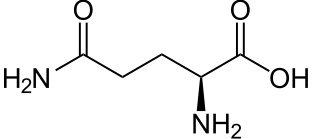 |
| Formulation of glutamine. |
Glutamine supplements can help maintain optimal nitrogen balance in the body and thus support protein synthesis (thus also muscle repair and growth).
In addition, it has been researched that this substance strengthens the immune system, which is essential for athletes who are subject to constant physical demand. For example, in football, basketball, tennis, athletics and all types of sports disciplines.
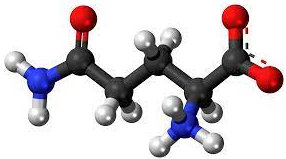 |
| Representation of glutamine molecule. |
Research on glutamine supplementation
Research on glutamine supplementation has been and is an area of ongoing interest in nutrition science and sports performance. This is demonstrated by the evidence. Over the years, numerous studies have explored its effects in a wide variety of contexts, from sport to general health, to see how it influenced and affected in the short or medium term.
In the sports field, there has been extensive research into how the supplement can influence muscle recovery and performances. One of the conclusions reached is that it effectively reduces muscle damage induced by intense exercise, accelerating recovery and reducing fatigue. Its ability to optimize muscle protein synthesis has also been studied , contributing to muscle growth and repair.
Likewise, glutamine is beneficial for athletes undergoing intense training and prolonged exercise regimens, as it helps maintain the balance of the immune system. This reduces the risk of infections, diseases related to overtraining and their respective consequences.
However, it is important to note that research results may vary, and some studies have shown mixed results regarding the benefits of supplementation with this substance. Furthermore, the appropriate dosage and ideal duration are also different depending on individual goals and specific needs of each person.
Other facts about glutamine in physical exercise that you should know
Glutamine is a neutral five-carbon amino acid with a molecular weight of 146.15 g/mol . It is considered the most abundant free amino acid in the human body. In adults, after an overnight fast, normal blood levels are 550-750 µmol/L, which contributes more than 20% of the amino acid pool.
In turn, in skeletal muscle , glutamine comprises 50-60% of the total pool of free amino acids, making it the most synthesized in human muscle, especially in slow-twitch muscles. Skeletal muscle releases the substance glutamine into the circulation at high rates; approximately 50 mmol per hour in the fed state.
It should be noted that organs can be classified as producers or consumers of glutamine : skeletal muscles, lungs, liver, brain and adipose tissue have high synthetase activity (an enzyme that synthesizes glutamine from ammonia and glutamate in the presence of adenosine triphosphate-ATP) and are considered producers of the substance.
On the other hand, leukocytes, enterocytes, colonocytes, thymocytes, fibroblasts and endothelial and tubular cells of the kidney have high glutaminase activity and are classified as consumers.

How does this molecule participate and influence?
To understand what glutamine is for , it is necessary to know its participation and influence in the body both eventually and in the future. The molecule participates in various biological functions, such as nucleotide synthesis, cell proliferation, regulation of protein synthesis and degradation, energy production, glycogenesis, ammonia detoxification and maintenance of acid-base balance, among others.
Furthermore, this amino acid regulates the expression of several genes associated with metabolism and activates numerous intracellular signaling pathways. From a nutritional point of view, glutamine is considered conditionally essential, since in catabolic situations, such as clinical trauma, burns, sepsis and prolonged and exhausting exercise, endogenous synthesis could be insufficient to meet the body's demand and, consequently, there be a deficiency.
Since the mid-1970s and 1980s, glutamine metabolism during and after physical exercise has been investigated. It was evident that the molecule responds differently depending on the duration of the activity and the intensity. An hour of calm exercise is not the same as 40 very intense minutes.
The shorter periods allow the release of glutamine in the muscle and its concentrations in the blood, while in longer and more exhaustive periods of activity, such as a marathon, the synthesis in the muscle is insufficient to satisfy the body's need. However, this decrease in synthesis is transient and appears to last 6 to 9 hours after a marathon and is accompanied by a 30-40% drop in muscle glutamine or its precursors such as glutamate. In any case, everything varies according to each organism, need and requirement.
5 benefits of glutamine
Different studies have shown dozens of benefits of glutamine . Some of the most important are the following:
Supporting Immune System Function: Glutamine is essential for the optimal functioning of immune system cells. Helps maintain and strengthen the intestinal barrier.
Muscle recovery: It is known for its role in repair After an intense workout, glutamine levels in the muscles decrease significantly. Therefore, supplementation can speed recovery, reduce pain and prevent catabolism.
Supports digestive system health: It is a fuel for the cells that line the lining of the gastrointestinal tract. Glutamine may help maintain the integrity of the intestinal mucosa and be beneficial in conditions such as leaky gut syndrome and inflammatory bowel diseases.
Reduced stress and anxiety: preserves levels of glutamate, an excitatory neurotransmitter in the brain. This can contribute to a feeling of well-being and reduce stress and anxiety.
Preservation of muscle mass during weight loss: When you follow a restrictive diet, your body draws on amino acid reserves, including glutamine , for energy.
Contraindications or issues to consider
As with different substances, glutamine cannot be abused or even ingested at any time or for no reason. For example, some contraindications or consequences may be the following:
Kidney failure: In individuals with chronic kidney disease or kidney failure, glutamine can accumulate in the body and increase the workload of the kidneys. Therefore, caution should be taken when using supplements.
Metabolic disorders: Some people may have inherited metabolic disorders (such as glutaric acidemia type I) that affect the breakdown of glutamine . In these cases, the excess of the substance is harmful.
Drug Interactions: As glutamine supplements can interact with certain medications, there is potential to alter the effectiveness of the medications or increase the risk of side effects. Consult your doctor before ingesting them.

How to take glutamine and how many doses are recommended?
As we indicated, the amount or intensity of glutamine supplementation will depend on various factors. Among them are the body, level of demand and training and objectives of each person. Generally, it is suggested to take 5 to 10 grams a day , divided into two or three doses . The supplement can be mixed with water or another beverage and taken before or after exercise or on an empty stomach.
You should not be too meticulous about the timing of glutamine intake. Depending on the needs of each one, some schedules or others are appropriate. Sometimes it is better to always do it the same way. In other cases, it may be advisable to vary until you find what is most appropriate.
Glutamine FAQ
If you want more information about this supplement, stay and read the list of frequently asked questions. Many users search for the following information.
What is glutamine for in the gym?
For people who weight train at a gym or do other anaerobic exercises, glutamine supplements could provide several benefits:
- Reduce fatigue due to physical activity.
- Promote muscle recovery and repair.
- Prevent dehydration.
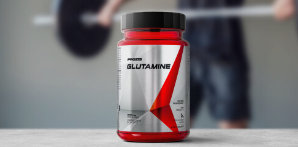
Although there are studies for and against glutamine supplementation for the gym, some research has found that this molecule can prevent the accumulation of ammonia (which is a consequence of muscle fatigue), which would improve performance.
In addition, it was found that glutamine could prevent dehydration, since it promotes rapid absorption of fluids. Hydration is very important for sports performance.
This gives us an idea of what glutamine is for in the gym and what serious studies exist to support its properties.
What are glutamine and BCAA for?
Other studies have been conducted on the effects of combining glutamine with different supplementation products . For example, there is some animal study that determines what glutamine and BCAA combined are for.
A combination of glutamine, BCCA, and arginine was administered to rats exercising on wheels. It was concluded that this solution increased the time and volume of exercise that the rats were able to tolerate training on the wheel. This did not happen when the animals were simply given water. The supplements also increased the plasma BCAA/tryptophan ratio and decreased the brain's release of serotonin, a precursor to fatigue.

In another study, a combination of glutamine, BCAAs, and whey protein was used in individuals who did resistance training for 10 weeks. However, in this case no improvement in strength, endurance or other physical abilities was observed.
There has also been research done on glutamine mixed with pre-workout supplements. A preworkout supplement (with glutamine, arginine, leucine, isoleucine, valine, taurine, β-alanine, creatine, glucuronolactone, and caffeine) was given to weightlifters. It was concluded that they could do more repetitions with 80% of 1RM on bench press and squats if they took the supplement 10 minutes before training.

Lastly, we have a study of glutamine combined with carbohydrates and other nutrients (protein and carnitine) for a 90-minute interval sprint workout. The supplement was supplied before, during and after this training. It was concluded that the combination of ingredients could partially attenuate muscle damage; however, no effect against training fatigue was observed.
What is glutamine for and how is it taken?
Glutamine, which may aid in fatigue reduction, recovery and decreased dehydration, is available as a supplement in powder or pill form . You can choose the most convenient format to take it.
 | 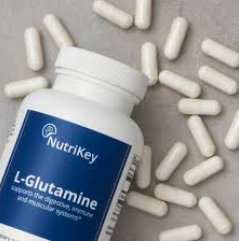 |
| Glutamine powder. | Glutamine in pills. |
An example of daily administration:
And what dose of glutamine should I ingest?
- Take 3 grams of glutamine per serving if you weigh less than 80 kg.
- Take 5 grams of glutamine per dose if you weigh more than 80 kg.
If you don't know when to take glutamine or what amounts , this may be a good plan.
What is L-glutamine used for and how is it taken?
L -glutamine is the type marketed as a dietary supplement. Consumption is carried out as we have explained: between 5 and 10 grams daily divided into several doses.
So what is the difference between glutamine and l-glutamine ?
Glutamine is a hydrophilic amino acid that is part of most proteins. On the other hand, L-glutamine is an isomer of glutamine. An isomer is understood to be an element that is composed of the same elements, and in the same proportions, as glutamine, but differs in some properties due to a difference in molecular structure.
Glutamine has two isomers, D-glutamine and L-glutamine. The latter is more abundant in organisms and has more applications as a supplement, for example, to stimulate the activity of immune cells in the intestine.
Should I know what L-glutamine is for compared to D-glutamine if I want to supplement? There's no need. Most likely, the supplements you purchase will only incorporate L-glutamine, so you won't have to choose between one type or another.
What are creatine and glutamine for?
- Creatine is used as a supplement basically to increase strength in anaerobic activities such as weight lifting. You can get maybe 5% more strength after a creatine load.
- Glutamine is used as a supplement to delay muscle fatigue and improve muscle tissue recovery.
These are different supplements. Are there benefits to combining creatine and glutamine? If we refer to the study that we indicated, which tried to demonstrate what glutamine and combined amino acids are for , we saw that strength in bench press and squats could be improved after ingesting a combination of glutamine, creatine, several amino acids and caffeine .
Are you interested? :
What is glutamine used for in athletes?
Some studies seem to corroborate that glutamine serves in athletes to improve muscle recovery, delay fatigue and prevent dehydration. This complement is used in many sports disciplines; most commonly in bodybuilding or weight lifting, but also in marathons, cycling, basketball, soccer, rowing, and other activities requiring post-workout muscle repair.
What is glutamine for in women?
The answer is exactly the same as what glutamine is for in men . L-glutamine can help reduce fatigue due to exercise and support muscle regeneration (the contractile tissue made up of proteins). Both sexes can use this supplement equally and with the same effects.

Does glutamine make you fat?
No. The reason is that 100 g of glutamine has about 313 calories, but the daily intake for an average person represents about 5 g. This would be less than 16 calories per serving, which is negligible.
Of course, keep in mind that we are only talking about glutamine. If it is included in another supplement with more ingredients, you will have to look at the supplement's total calories on the label. Other added ingredients could skyrocket the supplement's calories.
What function does glutamine have in the intestine?
Glutamine in the intestine is a fuel for the cells lining the gastrointestinal tract. It could help maintain the integrity of the intestinal mucosa and be beneficial against conditions such as leaky gut syndrome and inflammatory bowel diseases.
Therefore, consuming glutamine is good against intestinal diseases.
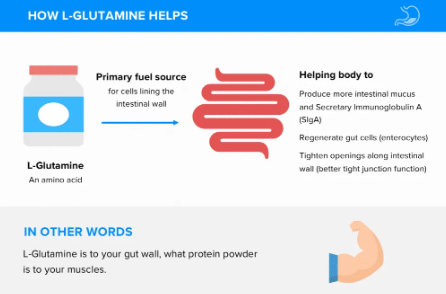 |
| The table, in English, indicates that L-glutamine is the main source of energy for the cells of the intestinal wall. It helps the body produce intestinal mucosa and secrete immunoglobulin A, which regenerates the intestinal entrances and walls. |
Does L-glutamine have contraindications?
Only for some people and they would be those we list in the "Contraindications or issues to consider" section . It is not advisable in cases of kidney failure, metabolic disorders or interactions with other medications. You should consult your doctor in these cases.
What is glutamine used for on an empty stomach?
There is no evidence of benefits from consuming this supplement on an empty stomach. As mentioned, it is recommended before and after training, or before going to sleep. You can consume glutamine on an empty stomach, but this is just a preference.
If you are on a restrictive diet with intermittent fasting , you may find it helpful to consume glutamine during the fasting period, especially if you are exercising (for muscle repair reasons).
Are you interested? :
We hope to have answered the question what glutamine is for, why is it useful, how much it is recommended to take it and other aspects. Be clear about your needs and consult a specialist if you need it.



![LAS MEJORES MÁQUINAS DE MUSCULACIÓN PARA PRINCIPIANTES [GUÍA 2025]](/modules//smartblog/images/no-home-small.jpg)
![HOW TO BUILD A HOME GYM ON A BUDGET [2024 GUIDE]](/modules//smartblog/images/296-home-small.jpg)


